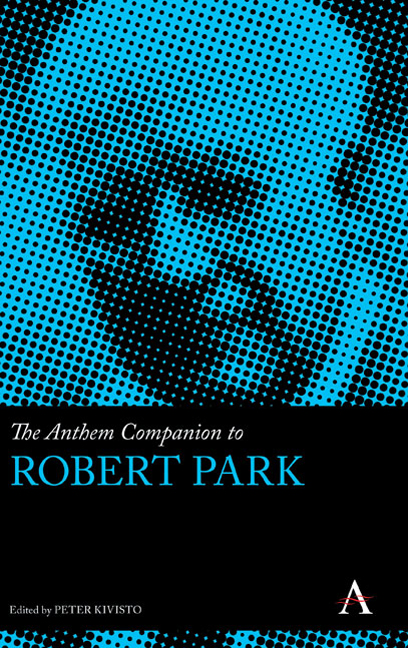Book contents
- Frontmatter
- Contents
- Introduction: The Legacy of Robert Ezra Park
- Chapter 1 A Twisted Path: Park, Gender and Praxis
- Chapter 2 Robert Park's Journey into Sociology
- Chapter 3 Beyond “Get the Seat of Your Pants Dirty in Real Research”: Park on Methods
- Chapter 4 The Basic Components of Social Action: Mead versus Park
- Chapter 5 Robert E. Park: Neglected Social Psychologist
- Chapter 6 Robert E. Park's Theory of Assimilation and Beyond
- Chapter 7 Robert Park's Marginal Man: The Career of a Concept in American Sociology
- Chapter 8 Marginality, Racial Politics and the Sociology of Knowledge: Robert Park and Critical Race Theory
- Chapter 9 The Cities of Robert Ezra Park: Toward a Periodization of His Conception of the Metropolis (1915–39)
- Chapter 10 The Impact of Robert E. Park on American Sociology of Religion
- Chronology
- Contributors
- Index
Chapter 8 - Marginality, Racial Politics and the Sociology of Knowledge: Robert Park and Critical Race Theory
Published online by Cambridge University Press: 10 January 2018
- Frontmatter
- Contents
- Introduction: The Legacy of Robert Ezra Park
- Chapter 1 A Twisted Path: Park, Gender and Praxis
- Chapter 2 Robert Park's Journey into Sociology
- Chapter 3 Beyond “Get the Seat of Your Pants Dirty in Real Research”: Park on Methods
- Chapter 4 The Basic Components of Social Action: Mead versus Park
- Chapter 5 Robert E. Park: Neglected Social Psychologist
- Chapter 6 Robert E. Park's Theory of Assimilation and Beyond
- Chapter 7 Robert Park's Marginal Man: The Career of a Concept in American Sociology
- Chapter 8 Marginality, Racial Politics and the Sociology of Knowledge: Robert Park and Critical Race Theory
- Chapter 9 The Cities of Robert Ezra Park: Toward a Periodization of His Conception of the Metropolis (1915–39)
- Chapter 10 The Impact of Robert E. Park on American Sociology of Religion
- Chronology
- Contributors
- Index
Summary
If the great German sociologist and philosophy Georg Simmel has been categorized as the theorist of modernity, then his pupil Robert E. Park is most frequently viewed as a theorist of everyday life. As a reporter and editor between 1891 and 1898, Park had first- hand knowledge of the urban environment and was generally interested in how news and public opinion were shaped. Park's intellectual curiosity over the conditions of communication was stimulated by his time as a reporter and his studies under the pragmatist John Dewey. Park conceived his interest in news and public opinion as the basis for his sociological education and saw his experience as a reporter as the foundation for his subsequent theoretical ideas (Lal 1990). Nevertheless, Park's association with the print media, his interest in public opinion and his curiosity with the everyday lives of urban dwellers are seen by some to hinder rather enhance his status as a social theorist.
Assessments of Park's work argue that it is atheoretical, too empirical and, worst of all, that his sociology is too “journalistic.” Smith (1988, 132) notes that the Chicago sociologists lacked an integrated sociological theory and that Chicago sociology was organized around practice, in which Park was the driving force. Other observers maintain “Park taught sociology by example and eschewed both formal statements of methodology and theory” (Turner and Turner 1990, 49). This orthodox perspective is misleading and somewhat unfair to Park. Revisionist literature proposes that Chicago sociologists such as Park and William Isaac Thomas “are significant and neglected sociological theorists” and what they contributed to American sociology during their reign at the University of Chicago “was a way of seeing the world theoretically” Bulmer 1997, 243). Park saw his major contribution to sociology as developing a set of concepts that would allow systematic classifications and analysis of social data. This conceptual approach in understanding the social world, in particular the urban milieu and race relations, highlights Park's belief in the importance of sociological theory. In Park's words: “The problem I was interested in was always theoretic rather than practical” (cited in Coser 1977, 357).
- Type
- Chapter
- Information
- The Anthem Companion to Robert Park , pp. 181 - 200Publisher: Anthem PressPrint publication year: 2017



